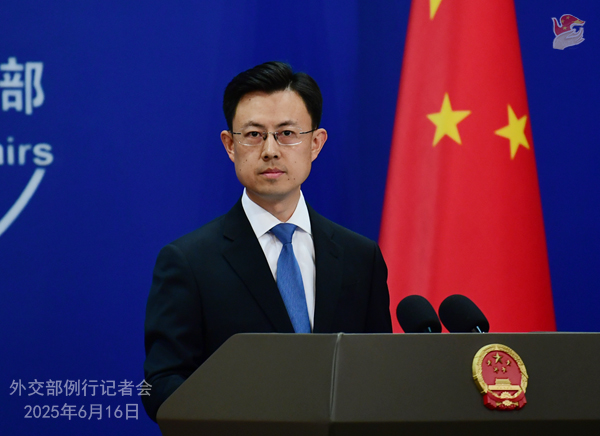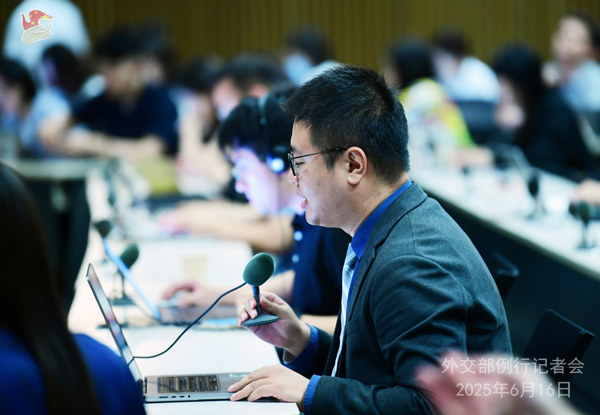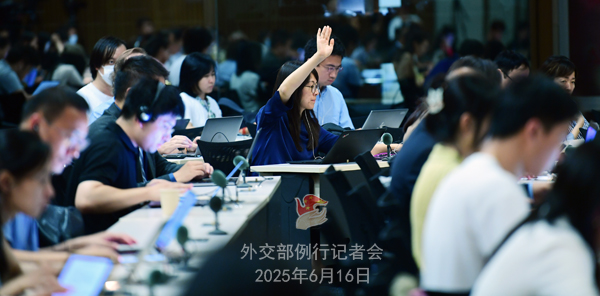
CGTN: In 2013, President Xi Jinping for the first time proposed the initiative of building the Silk Road Economic Belt during his visit to Kazakhstan. The Belt and Road Initiative has since become one of the most popular global public goods. The Second China-Central Asia Summit is about to kick off. Can you brief us on the Belt and Road cooperation between China and Central Asian countries and China’s expectation for future cooperation?
Guo Jiakun: Central Asia is not only the place where the Belt and Road Initiative (BRI) was first proposed, but also a pace-setter in high-quality Belt and Road cooperation. All five Central Asian countries have signed BRI cooperation documents with China. Together, China and Central Asian countries have implemented a series of signature projects designed to boost development and make lives better for the people. Trade between China and Central Asian countries hit a record high of RMB 674.15 billion in 2024, up by 116 percent compared with that of 2013. Through the China-Kazakhstan Crude Oil Pipeline project and the China-Central Asia Gas Pipeline project, we have found a new model of mutually beneficial cooperation. The China-Tajikistan highway, the China-Kyrgyzstan-Uzbekistan highway and the China-Kyrgyzstan-Uzbekistan railway have taken regional connectivity to new levels. Practical cooperation is expanded to digital economy and green transition. China has mutual visa exemption with Kazakhstan and Uzbekistan. The Luban Workshops project is picking up speed. People-to-people and cultural exchanges have moved onto the fast lane and brought our peoples close to each other. High-quality Belt and Road cooperation is increasingly becoming a key focus of China-Central Asia cooperation.
At the upcoming Second China-Central Asia Summit, heads of state will jointly draw a new blueprint for future cooperation, open up new space for Belt and Road cooperation and build an even closer China-Central Asia community with a shared future.

Rudaw Media Network: Chinese Foreign Minister has spoken with his Iranian and Israeli counterparts, stating that targeting nuclear sites is a dangerous development. Does China perceive any risk of the conflict expanding or escalating into a broader war in the region? What measures is China taking to prevent the war from spreading to other Middle Eastern countries?
Guo Jiakun: China is deeply concerned about Israel’s attacks on Iran, which caused the spike of military conflicts. We call on parties to immediately take measures to ease tensions as soon as possible, prevent the region from spiraling into greater turmoil, and create conditions for returning to the right track of resolving issues through dialogue and negotiation.
If the conflict between Israel and Iran continues to escalate or even spill over, the other countries in the Middle East will inevitably bear the brunt. Foreign Minister Wang Yi has spoken to Iranian Foreign Minister Seyed Abbas Araghchi and Israeli Foreign Minister Gideon Sa’ar on the phone, calling on both sides to resolve differences through dialogue. Relevant parties need to take measures immediately to put a brake on the escalation of the conflict and bring down the temperature of the situation.
Let me stress that force cannot bring lasting peace, all international disputes should be settled through dialogue and consultation, and only by upholding the vision of common security can the legitimate concerns of all parties be thoroughly addressed. China will continue to maintain communication with relevant parties and promote talks for peace, so as to prevent more turmoil in the region.
CCTV: In a recent statement, Brazil, the BRICS Chair, said Viet Nam becomes a BRICS partner country. What’s China’s comment?
Guo Jiakun: China welcomes Viet Nam to become a BRICS partner country. Joining BRICS cooperation is good for Viet Nam’s own development and the common interest of BRICS countries and the Global South. We believe Viet Nam will contribute positively to the BRICS mechanism.
Having a new partner country in the BRICS family symbolizes the BRICS’ growing representativeness, appeal and impact. China stands ready to work with other BRICS members and partner countries for a closer and more all-round, result-oriented and inclusive partnership, advance high-quality greater BRICS cooperation, and contribute more to defending multilateralism and global fairness and justice and advocating common development.
AFP: Just a quick follow-up on Israel and Iran. Has there been any more contact between Chinese and Iranian and Chinese and Israeli officials since Wang Yi’s call to them over the weekend? And how does China now view the feasibility of a nuclear deal?
Guo Jiakun: As I just said, Foreign Minister Wang Yi had phone conversations with foreign ministers of Israel and Iran over the weekend respectively, urging the two sides to address differences through dialogue. China will continue playing a constructive role in solving the ongoing conflict. On the prospect of the Iranian nuclear negotiations, let me stress that China calls for a peaceful settlement of the Iranian nuclear issue through political and diplomatic means. We stand ready to maintain communication and coordination with relevant parties, play a constructive role for the deescalation of the situation, and create a favorable environment for the political and diplomatic settlement of the Iranian nuclear issue.

Global Times: It’s reported that the U.S. Embassy in Panama said the U.S. government will work with Panama’s Ministry of Public Security to add seven new communications towers with secure American technology in two years in place of installed Huawei telecommunications equipment. The embassy said “the U.S. is working to counter the malign influence of China throughout our hemisphere, making the Americas stronger and more secure.” Panamanian President Jose Raul Mulino responded that the U.S. Embassy should refrain from making public pronouncements about decisions made solely by the Panamanian government, and the U.S. has no right to comment on decisions that concern Panama’s national government. What’s China’s comment?
Guo Jiakun: The U.S. has long engaged in mass surveillance and cyberattacks on Latin America and the Caribbean (LAC), which create malign influence throughout the Western Hemisphere and make countries in Americas insecure.
China supports Panama and other LAC countries in upholding independence and opposing hegemonism, bullying and external interference. China’s friendly cooperation with LAC countries always follows the principles of mutual respect, equality, mutual benefit, openness, inclusiveness and win-win. We never seek sphere of influence or engage in geopolitical competition, still less coerce other countries into picking sides.
The LAC region is no one’s backyard. The U.S. needs to stop acting like a bully. It needs to stop politicizing trade and tech issues, stop interfering in other countries’ internal affairs, undermining their sovereignty and independence and coercing them into picking sides and restricting cooperation with China. The U.S. should put its energy into making the region more peaceful, stable and prosperous.
NHK: According to the SIPRI Yearbook 2025 released by the Stockholm International Peace Research Institute on June 16, China now has 600 nuclear warheads, ranking third in the world. China’s nuclear arsenal is growing faster than any other country’s, by about 100 new warheads a year. What’s your comment?
Guo Jiakun: We have no comment on relevant report. Let me just stress that China follows a nuclear strategy that focuses on self-defense. China always keeps its nuclear capabilities at minimum level required by national security, and never engages in arms race. China follows a policy of “no first use” of nuclear weapons at any time and under any circumstances and has committed unconditionally to not using or threatening to use nuclear weapons against non-nuclear weapon states and nuclear-weapon-free zones. China is the only nuclear weapon state to have adopted such a policy. China will stay firmly committed to safeguarding its own legitimate security interests and keeping the world peaceful and stable.
AFP: The Guardian citing UK government sources reported that China is considering lifting another batch of sanctions it imposed in 2021 on several UK lawmakers after they highlighted human rights violations against Uyghur Muslims in Xinjiang. Was the topic of lifting sanctions raised in any of the meetings between Chinese and UK officials in London last week? And does the Foreign Ministry have any comment on this?
Guo Jiakun: I’m not aware of what you mentioned. Let me stress that the sanction was a necessary countermeasure as a response to the UK’s groundless sanctions targeting Chinese personnel and entities. The facts and merits of the matter are very clear. Equality, mutual benefit and readiness to work together form the foundation of a bilateral relationship and the principles for solving any dispute.
Bloomberg: The Washington Post is investigating a cyber attack on the email accounts of some journalists and reporters of several news agencies. The attack was first reported by the Wall Street Journal, but cited unidentified sources as saying the hack was potentially the work of a foreign government. The report said journalists on the national security and economic policy teams, including those covering China, have been targeted. I wonder if the Foreign Ministry has any comments.
Guo Jiakun: I’m not familiar with what you mentioned. Cyberattack is a common challenge faced by all countries. China firmly opposes and combats all forms of cyberattacks in accordance with the law. We stand ready to work with all parties to jointly address cyber threats through dialogue and cooperation.
